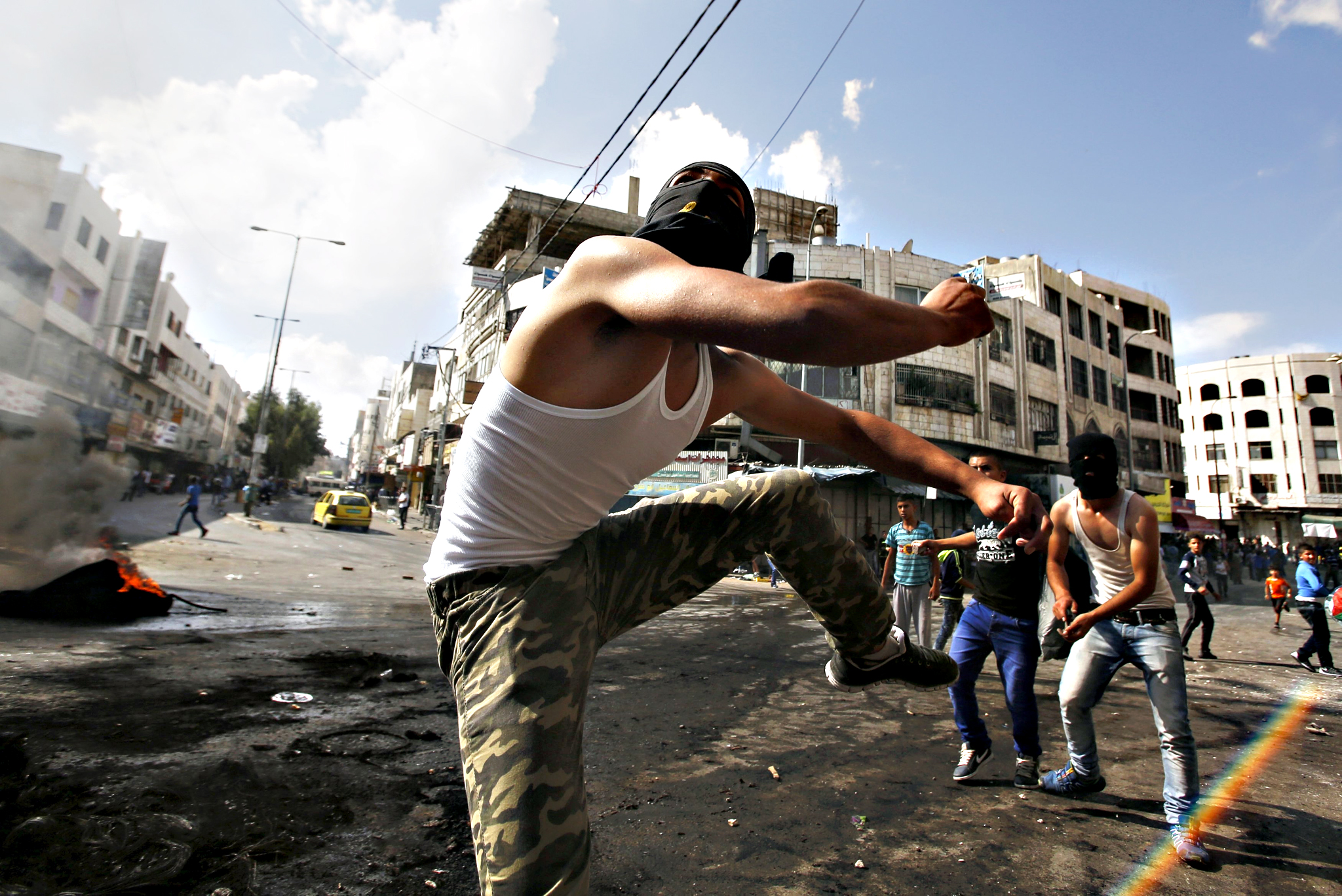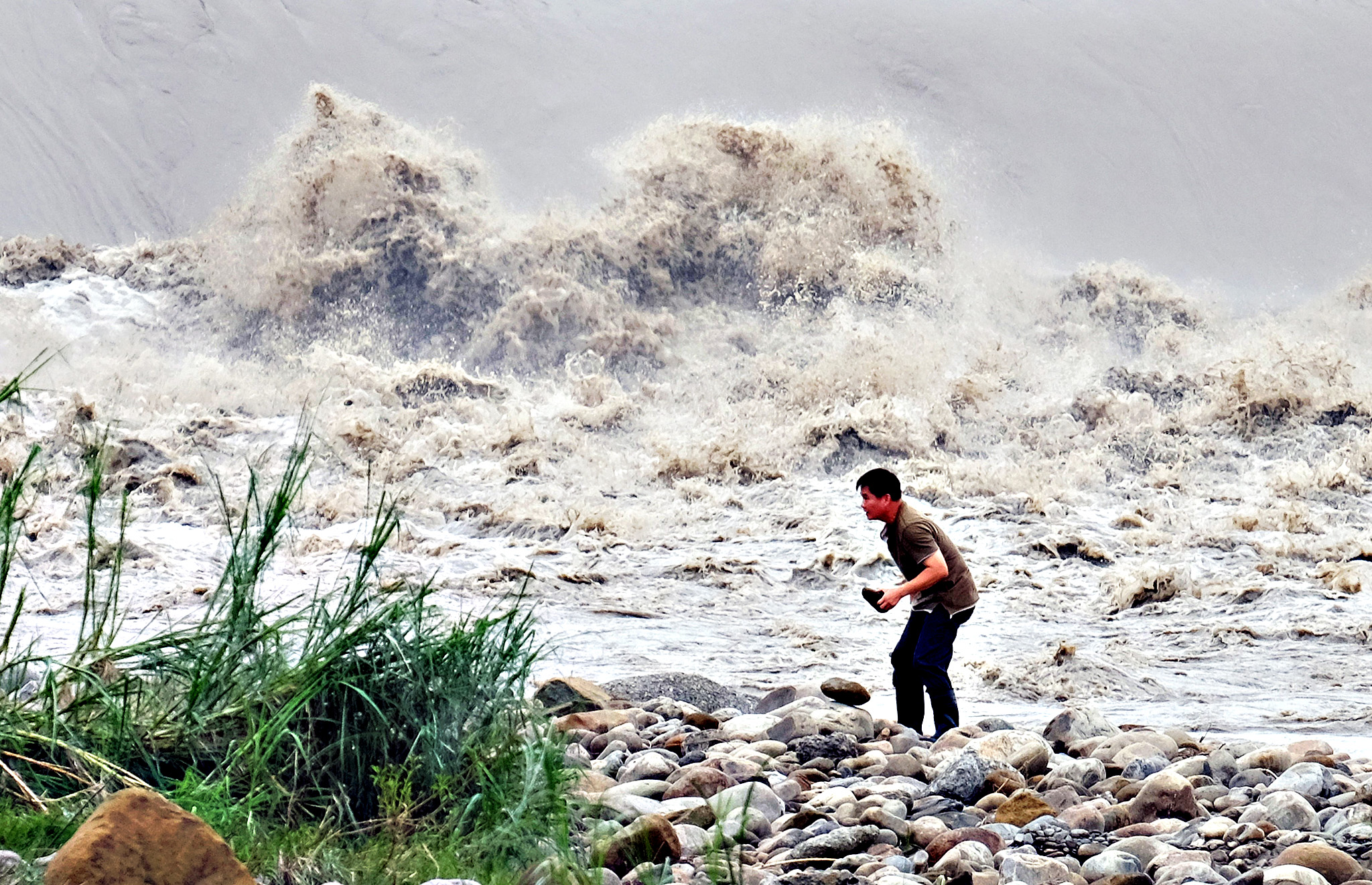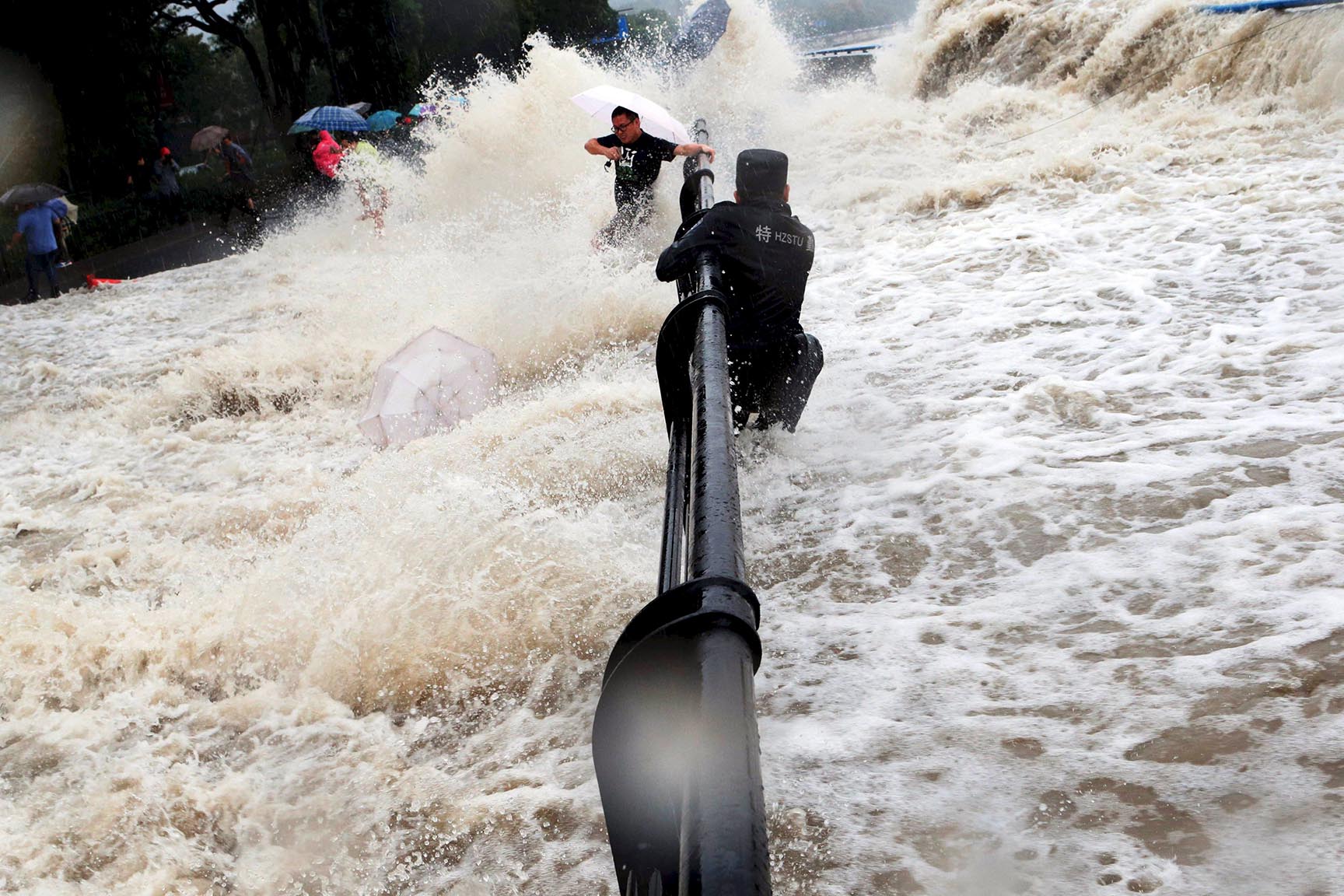.
An Afghan girl sheds a tear upon her arrival with other refugees and migrants to the Greek island of Lesbos after crossing the Aegean sea from Turkey on Tuesday: photo by Aris Messinis/AFP, 29 September 2015
Cairo taken from an airplane on Wednesday shows a section of the Egyptian capital of Cairo and the Nile River: photo by Khaled Desouki/AFP, 30 September 2015
The struggles of migrant mothers: image via Reuters Top News @Reuters, 29 September 2015
A migrant child leans out of a train window for food at a station in Tovarnik: image via Reuters Top News @Reuters, 29 September 2015
An Israeli policeman prevents a Palestinian man from entering the compound which houses al-Aqsa mosque, known by Muslims as the Noble Sanctuary and by Jews as the Temple Mount, in Jerusalem’s Old City: photo by Ammar Awad/Reuters, 29 September 2015
Turkish tourists are seen trying to take shelter during clashes between Palestinians protesters and Israeli police near the entrance of al-Aqsa mosque compound in Jerusalems old city on Monday: photo by Ahmad Gharabli/AFP, 29 September 2015
![Palestinian protesters throw stones at Israeli troops during clashes over tension in Jerusalem's al-Aqsa mosque, in the occupied West Bank city of Hebron...Palestinian protesters throw stones at Israeli troops during clashes over tension in Jerusalem's al-Aqsa mosque, in the occupied West Bank city of Hebron September 29, 2015. Israeli police and Palestinians clashed on Sunday at Jerusalem's al-Aqsa mosque compound, where violence in recent weeks has raised international concern.]()
Palestinian protesters throw stones at Israeli troops during clashes over tension in Jerusalem’s al-Aqsa mosque, in the occupied West Bank city of Hebron on Tuesday: photo by Mussa Qawasma/Reuters, 29 September 2015
Waves in the Xindian river after Typhoon Dujuan passed in New Taipei City on Tuesday. Super typhoon Dujuan killed two and left more than 300 injured in Taiwan before making landfall in China: photo by Sam Yeh/AFP, 29 September 2015
A paramilitary policeman holds onto a fence as tourists dodge tidal waves increased under the influence of Typhoon Dujuan, at the bank of Qiantang river, in Hangzhou, Zhejiang province: photo by Reuters, 30 September 2015
![NUCLEAR-POWERED NAVAL VESSELS TIME 09/17/1956 p. 101]()
General Dynamics nuclear-powered naval vessels ad: Time, 17 September 1956 (Gallery of Graphic Design)
![NUCLEAR PUMPS LIFE 04/08/1957 p. 156]()
Borg-Warner advertisement: Life, 8 April 1957 (Gallery of Graphic Design)
![Disney - Bad Day At The Office? | by Express Monorail]()
Disney -- Bad Day at the Office? Walt Disney's Carousel of Progress (Walt Disney's Carousel of Progress, Tomorrowland, Magic Kingdom, Disney World Resort, Bay Lake, Florida): photo by Joe Pennington, 15 November 2008
#HTV5 descends to Earth today as #Progress rolls out to launch pad for Thurs cargo launch...: image via Intl. Space Station @Space_Station, 29 September 2015![http://lcweb2.loc.gov/service/pnp/highsm/04800/04890v.jpg]()
Antique cars and trucks along the roadside, Montana: photo by Carol M. Highsmith, 29 September 2005 (Library of Congress)
![http://lcweb2.loc.gov/service/pnp/highsm/04800/04888v.jpg]()
Antique trucks along the road, Montana: photo by Carol M. Highsmith, 29 September 2005 (Library of Congress)
![IMG_3027 | by princesskoko]()
[Window upon a World That Never Was]: photo by princesskoko, 27 September 2012
An Afghan girl sheds a tear upon her arrival with other refugees and migrants to the Greek island of Lesbos after crossing the Aegean sea from Turkey on Tuesday: photo by Aris Messinis/AFP, 29 September 2015
This is the only chance we are ever going to have
to be here. Finding traces of liquid water once flowing on the red planet
is a way of forgetting that there's not much time left
for the long awaited benefits of progress
to finally kick in where we are. I'm still a little unclear on that concept says radio
lady who's now quoting Pope, the. And there went the End
of Days again. A White Moon appeared to Kim above the cabins
but she don't care. Have we moved to an earlier chapter, when in Big Smoky Valley
the nights of the infinitely small figures in the picture
which has fallen over on the mantle during every almost imperceptible tremor
rippling away from the test range, and is held together by some kind of tape,
grow longer now, touched by mists and a light
rain has begun to fall. That gal don't know one thing. One tear
shed here on ancient desiccated Earth in this moment means more to tiny me
than a rocking briny lake last week or a million years ago on Mars.
Scientists find first evidence that briny water flowed on the surface of #Mars: image via Reuters Top News @Reuters, 28 September 2015
Cairo taken from an airplane on Wednesday shows a section of the Egyptian capital of Cairo and the Nile River: photo by Khaled Desouki/AFP, 30 September 2015
The struggles of migrant mothers: image via Reuters Top News @Reuters, 29 September 2015
A migrant child leans out of a train window for food at a station in Tovarnik: image via Reuters Top News @Reuters, 29 September 2015
Turbulence
An Israeli policeman prevents a Palestinian man from entering the compound which houses al-Aqsa mosque, known by Muslims as the Noble Sanctuary and by Jews as the Temple Mount, in Jerusalem’s Old City: photo by Ammar Awad/Reuters, 29 September 2015
Turkish tourists are seen trying to take shelter during clashes between Palestinians protesters and Israeli police near the entrance of al-Aqsa mosque compound in Jerusalems old city on Monday: photo by Ahmad Gharabli/AFP, 29 September 2015

Palestinian protesters throw stones at Israeli troops during clashes over tension in Jerusalem’s al-Aqsa mosque, in the occupied West Bank city of Hebron on Tuesday: photo by Mussa Qawasma/Reuters, 29 September 2015
Waves in the Xindian river after Typhoon Dujuan passed in New Taipei City on Tuesday. Super typhoon Dujuan killed two and left more than 300 injured in Taiwan before making landfall in China: photo by Sam Yeh/AFP, 29 September 2015
A paramilitary policeman holds onto a fence as tourists dodge tidal waves increased under the influence of Typhoon Dujuan, at the bank of Qiantang river, in Hangzhou, Zhejiang province: photo by Reuters, 30 September 2015
Walter Benjamin: Kafka and Progress: In a Swamp World

General Dynamics nuclear-powered naval vessels ad: Time, 17 September 1956 (Gallery of Graphic Design)
Kafka's shame, then, is no more personal than the life and thought which govern it and which he has described thus: "He does not live for the sake of his own life, he does not think for the sake of his own thought. He feels as though he were living and thinking under the constraint of a family. . . . Because of this unknown family . . . he cannot be released." We do not know the make-up of this unknown family, which is composed of human beings and animals. But this much is clear: it is this family that forces Kafka to move cosmic ages in his writings. Doing this family's bidding, he moves the mass of historical happenings as Sisyphus rolled the stone. As he does so, its nether side comes to light; it is not a pleasant sight, but Kafka is capable of bearing it. "To believe in progress is not to believe that progress has taken place. That would be no belief." Kafka did not consider the age in which he lived as an advance over the beginnings of time. His novels are set in a swamp world. In his works, created things appear at the stage which Bachofen has termed the hetairic stage. The fact that it is now forgotten does not mean that it does not extend into the present. On the contrary, it is actual by virtue of this very oblivion.
Walter Benjamin: excerpt from Franz Kafka: On the Tenth Anniversary of his Death, from Jüdische Rundschau, 1934, translated by Harry Zohn in Illuminations, 1968
Walter Benjamin: excerpt from Franz Kafka: On the Tenth Anniversary of his Death, from Jüdische Rundschau, 1934, translated by Harry Zohn in Illuminations, 1968

Borg-Warner advertisement: Life, 8 April 1957 (Gallery of Graphic Design)

Disney -- Bad Day at the Office? Walt Disney's Carousel of Progress (Walt Disney's Carousel of Progress, Tomorrowland, Magic Kingdom, Disney World Resort, Bay Lake, Florida): photo by Joe Pennington, 15 November 2008
#HTV5 descends to Earth today as #Progress rolls out to launch pad for Thurs cargo launch...: image via Intl. Space Station @Space_Station, 29 September 2015
Theodor Adorno on the Concept of Progress: "it promises an answer to the doubt and the hope that things will finally get better, that people will at last be able to breathe a sigh of relief"

Antique cars and trucks along the roadside, Montana: photo by Carol M. Highsmith, 29 September 2005 (Library of Congress)
For a theoretical account of the category of progress it is necessary to scrutinize the category so closely that it loses its semblance of obviousness, both in its positive and its negative usage. And yet such proximity also makes the account more difficult. Even more than other concepts, the concept of progress dissolves upon attempts to specify its exact meaning, for instance what progresses and what does not. Whoever wants to define the concept precisely easily destroys what he is aiming at. The subaltern prudence that refuses to speak of progress before it can distinguish progress in what, of what, and in relation to what, displaces the unity of the moments, which within the concept ritually elaborate each other, into a mere juxtaposition. By insisting on exactitude where the impossibility of the unambiguous appertains to the subject matter itself, dogmatic epistemology misses its object, sabotages insight and helps to perpetuate the bad by zealously forbidding reflection upon what, in the age of both utopian and absolutely destructive possibilities, the consciousness of those entangled would like to discover: whether there is progress. Like every philosophical term, 'progress' has its equivocations; and as in any such term, these equivocations also register a commonality. What at this time one should understand by 'progress' one knows vaguely, but precisely: for just this reason one cannot employ the concept roughly enough. To use the term pedantically merely cheats it out of what it promises: an answer to the doubt and the hope that things will finally get better, that people will at last be able to breathe a sigh of relief. For this reason alone one cannot say precisely what progress should mean to people, because the crisis of the situation is that precisely while everyone feels the crisis, the words bringing resolution are missing. Only those reflections about progress have truth that immerse themselves in progress and yet maintain distance, withdrawing from paralyzing facts and specialized meanings. Today reflections of this kind come to a point in the contemplation of whether humanity is capable of preventing catastrophe. The forms of humanity's own global societal constitution threaten its life, if a self-conscious global subject does not develop and intervene.
Theodor Adorno: excerpt from Progress, Lecture at Münster Philosophers' Congress, 22 October 1962, translated by Henry Pickford in Critical Models: Interventions and Catchwords, 1998

Antique trucks along the road, Montana: photo by Carol M. Highsmith, 29 September 2005 (Library of Congress)

[Window upon a World That Never Was]: photo by princesskoko, 27 September 2012












